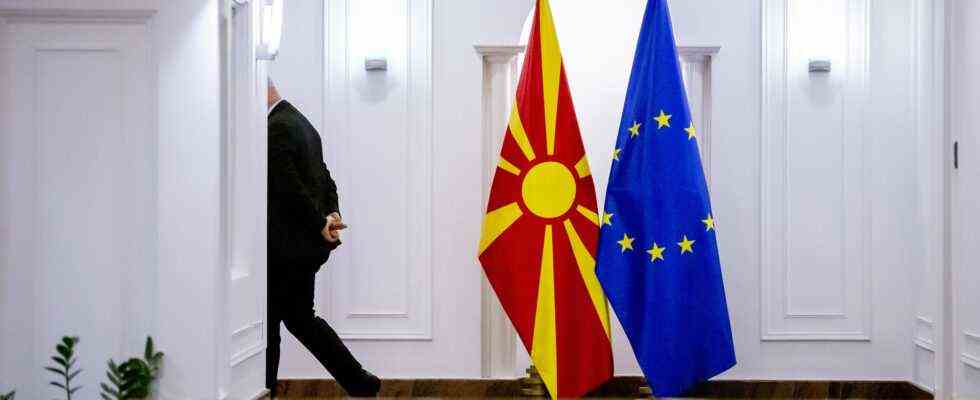Status: 05.10.2021 7:26 p.m.
The EU summit is intended to dispel frustration among the six Western Balkan states. None of them have any quick accession illusions – but each one appears self-confidently with their own interests.
In front of the town hall in Ljubljana, EU flags flutter in the mild autumn wind. Slovenia’s capital also won the award for the greenest capital in Europe in 2016. A lot has happened since then – and the enthusiasm for Europe in the country and in the Western Balkans has been dampened. This is particularly true of the six countries that are candidate countries with more or less firm prospects: Albania, North Macedonia, Montenegro, Bosnia, Serbia and Kosovo.
For Slovenia’s Prime Minister Janez Jansa, the summit host, the EU enlargement is the now necessary “strategic answer” after a decade of crises in which the EU has regressed – he cites the example of Brexit. “If the EU doesn’t expand, others will expand,” he says. He is referring to Russia and China – he does not name them, but his message is understood by the EU heads of state and government.
He is looking forward to the EU summit, says Jansa. Hence the highest Slovenian order for the still executive German Chancellor Angela Merkel on the first summit evening in Brdo, an hour’s drive from Ljubljana. In the laudation, Merkel was praised for her “credible European leadership”. The countries of the Western Balkans saw in her a good lawyer.
Bulgaria blocks North Macedonia
Take North Macedonia and Albania, for example: in North Macedonia and Albania, it was attentive to how Merkel criticized the EU on her farewell tour in the Balkans: If the conditions are met for the start of accession talks, then the EU must keep its word and should not follow suit, because ” that creates disappointment, “said Merkel.
North Macedonia has delivered, is the belief in Skopje and other parts of the country. The decade-old name dispute with Greece has been resolved, the country with two million inhabitants has been renamed, and North Macedonia’s President Stevo Pendarovski is on a state visit to Athens at the same time as the EU summit of heads of government – a historic event.
But Bulgaria is still blocking: The EU neighbor says unfriendly that “Macedonian” is just a Bulgarian dialect, Skopje should kindly recognize that. EU compromise talks are ongoing, but the North Macedonians are missing sufficient support in Brussels. And they are concerned that until the dispute is over, new hurdles could become a problem – steps backwards in the fight against corruption, for example. Another problem is the deadlock in Bulgaria, as there is currently no legally competent government there.
Kosovars are looking to Washington
People in Albania are also upset. Although promised since March 2020, there is still no start date for the start of admissions interviews. The EU sees Albania in a double pack with North Macedonia. Here, too, there is concern that the blockade could unnecessarily slow down reforms in the country. Because of course there is still a lot to do in Albania – for example with regard to the rule of law.
Just before the Western Balkans summit, the conflict over car license plates between Serbia and Kosovo escalated. The compromise was pragmatic and sleek: Now each other’s emblems are simply masked off when crossing the border – and a working group in Brussels is looking for a sustainable solution. The Kosovars would have liked a faster announcement by the EU and are looking expectantly to Washington.
Influential Serbia
As the largest country with seven million inhabitants, Serbia relies on its key role in the region. Although – or precisely because – it is stuck in the EU waiting loop, the Serbs continue to maintain their traditionally close proximity to Russia. The Russians finance major projects, as does China. Serbia gains leverage in this way. The EU hopes for Serbia’s influence in the region – but the conflict with Kosovo and the non-recognition of the neighboring country remain an insurmountable hurdle.
The Kosovars also want to join the EU and know that it will take time. Your state is not even recognized as independent by all EU countries. That is why the wishes in Pristina are very pragmatic: stronger and easier cooperation of the economy in the region, cheaper roaming tariffs for mobile telephony, finally visa-free for Kosovars who travel to the EU. Another old promise that the EU has not kept.
More permeable borders in the Western Balkans are a goal that not only the EU High Commissioner for Bosnia and Herzegovina, Christian Schmidt, emphasizes again and again: He is promoting the “idea of a European regional economic cooperation between the Balkan countries” as a promising path – far away from an EU membership. After all, such a cooperation could be achieved during the differently slow rapprochement processes of the six candidate countries to the EU.
A clearly formulated EU perspective for the six states at this summit would facilitate this process – that is the motto and the expectation of the Western Balkan states of the EU. And best of all without new rules of the game that are difficult to fulfill – that is, without a back door through which individual EU countries can sneak if other problems suddenly become more important again.

